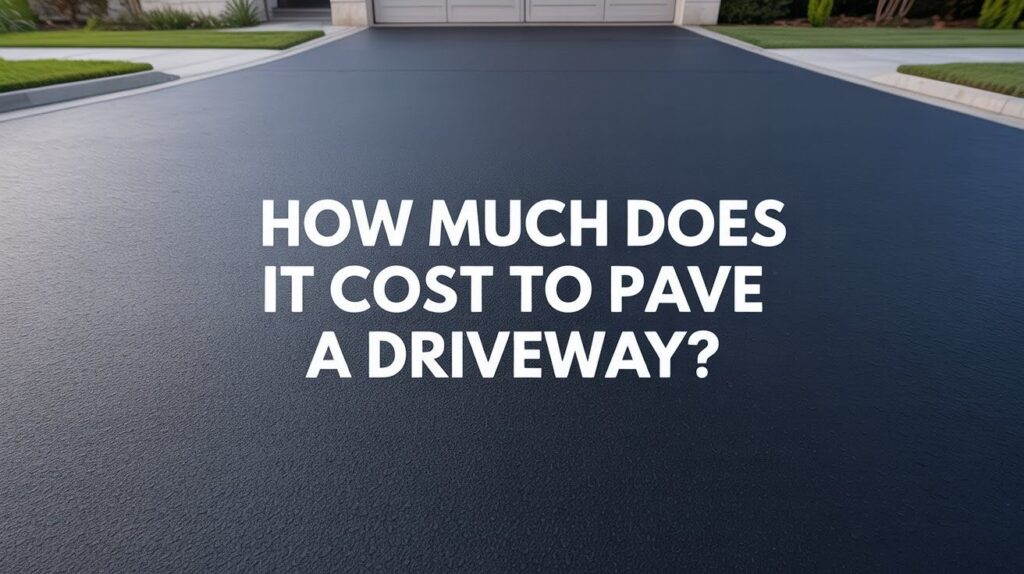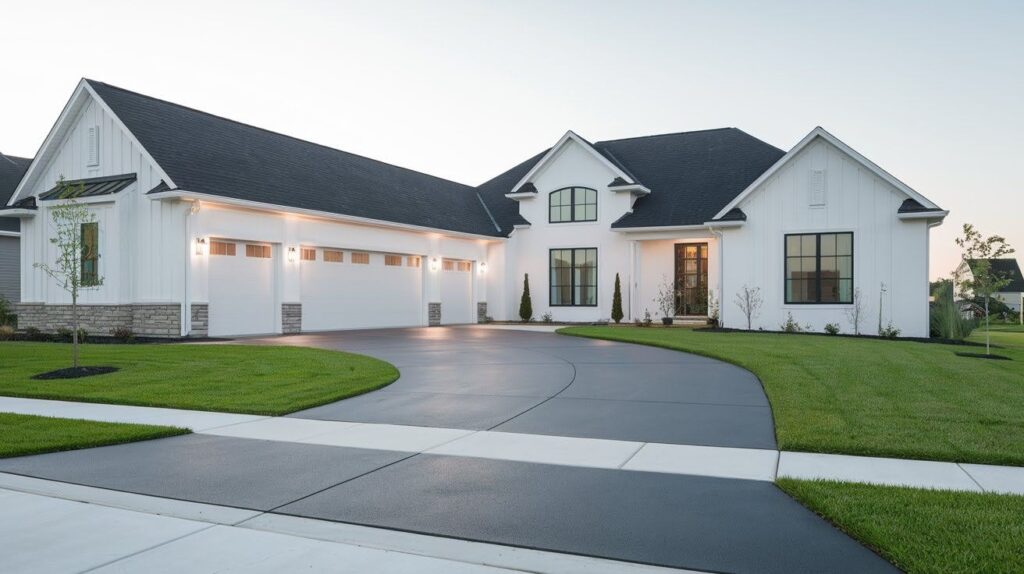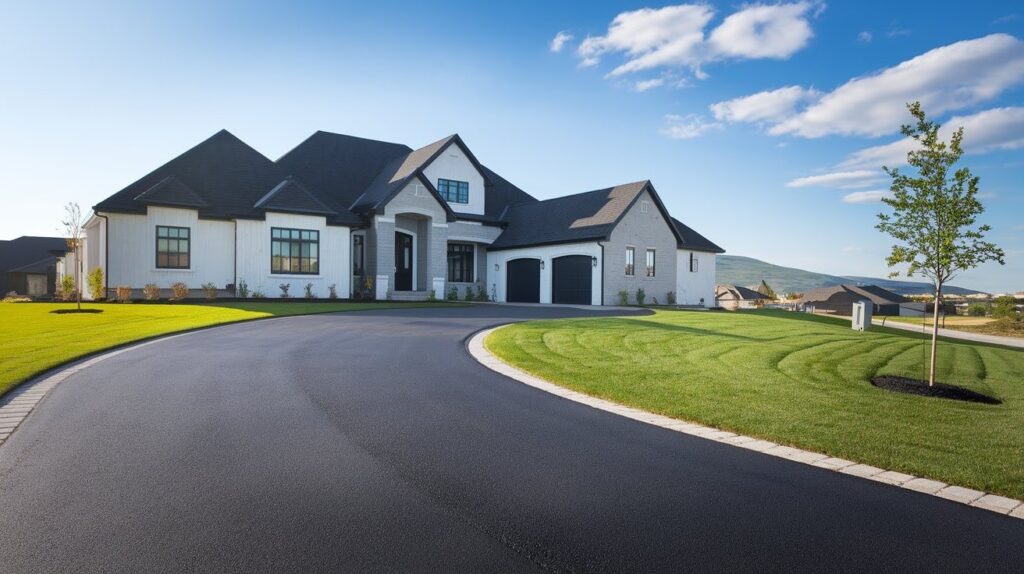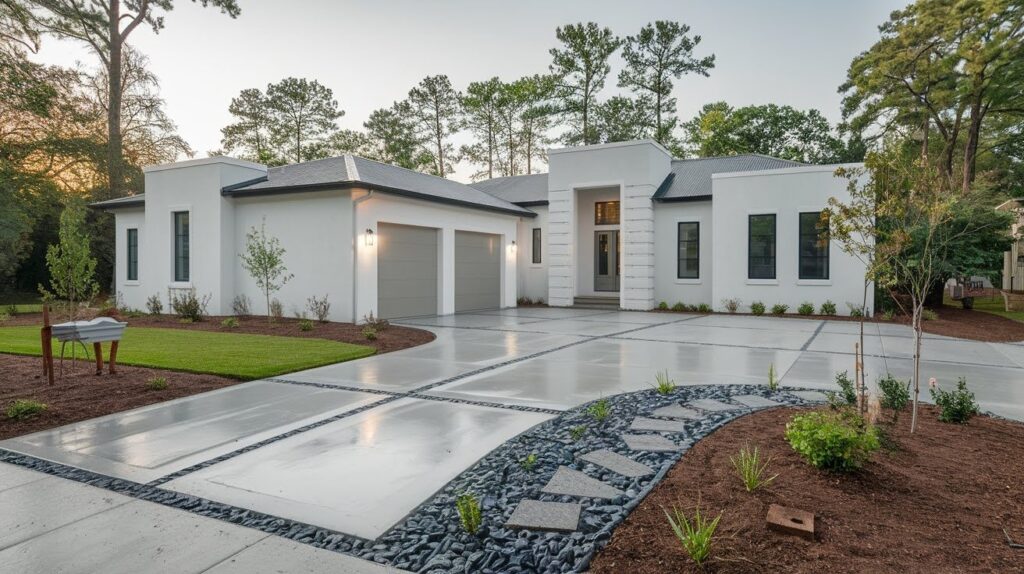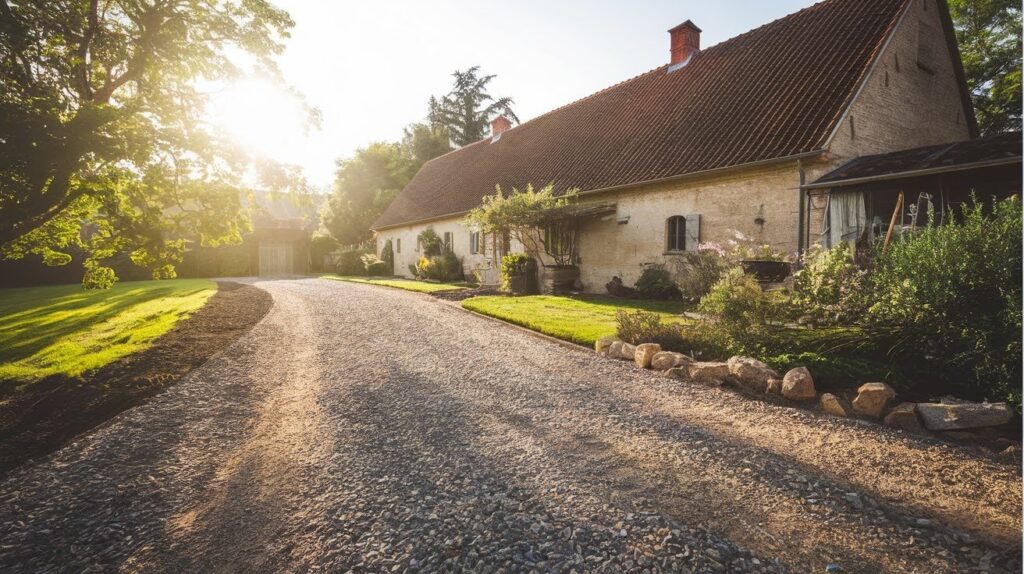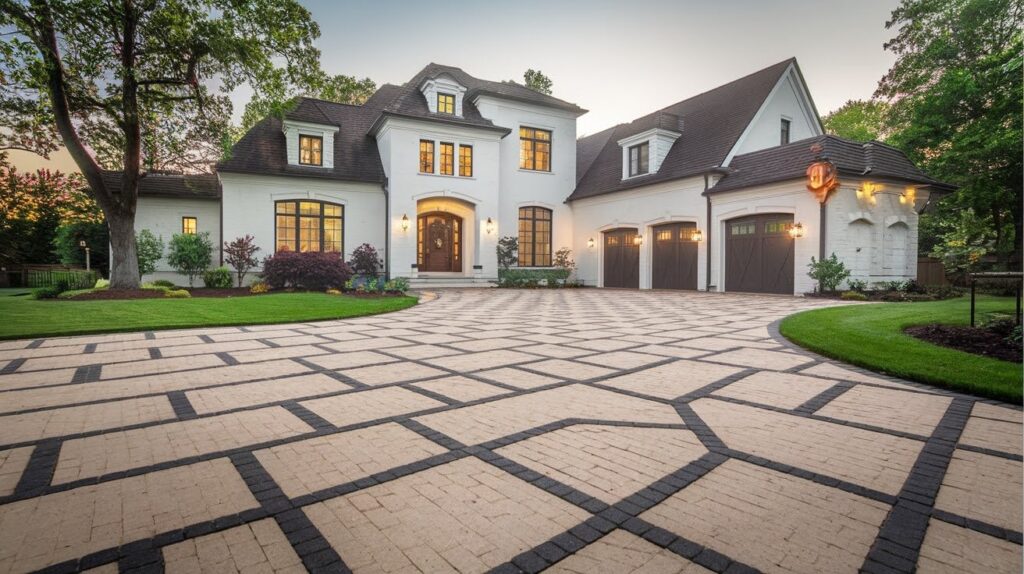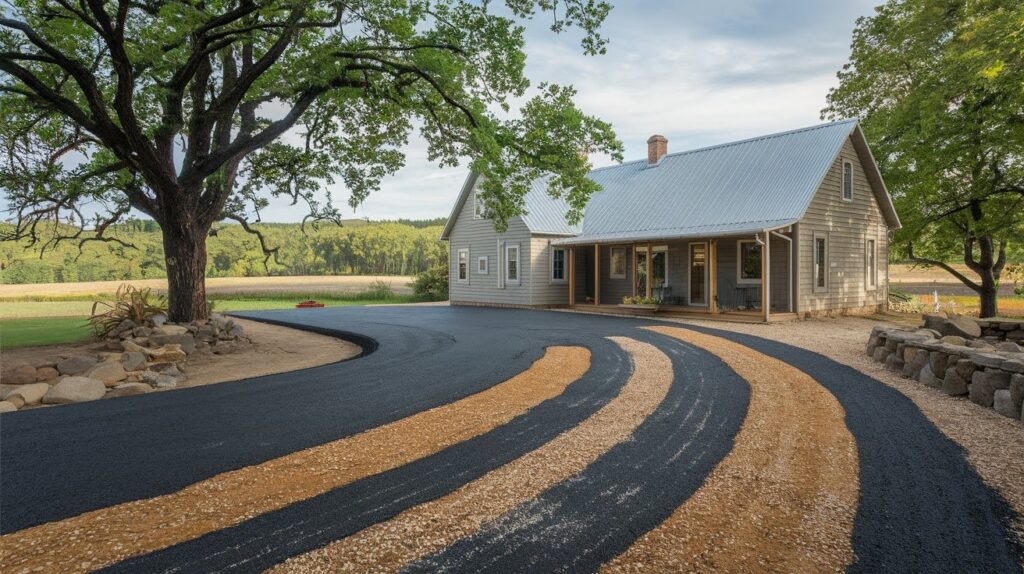Planning a new driveway but worried about the cost? You’re asking the right questions. I’ll give you the exact numbers you need to budget for your project. This guide covers real pricing for every driveway material.
You’ll learn what asphalt, concrete, gravel, and pavers actually cost. I’ll also show you hidden expenses that catch homeowners off guard.
Why trust this information? I’ve researched current contractor quotes and material prices from across the country.
No guesswork here. You’ll find cost breakdowns by material type, factors that affect your final price, and smart ways to save money. I’ll even tell you which options give the best return on investment.
Ready to get accurate costs for your driveway project? Let’s look at the real numbers. Most homeowners spend between $2,500 and $7,300 to pave a driveway, with an average cost of about $4,900. But your actual cost depends on several factors I’ll break down for you.
Average Cost to Pave a Driveway
Here’s what you can expect to pay for a standard 600-square-foot (two-car) driveway:
- Budget option: $1,500 – $3,000 (gravel or basic tar-and-chip)
- Mid-range: $4,200 – $7,800 (asphalt)
- Higher cost: $4,800 – $9,000 (concrete)
- Premium: $6,000 – $18,000 (pavers or brick)
Your final cost depends on material type, driveway size, and your location. Let me walk you through each option.
Driveway Paving Cost by Material Type
a. Asphalt Driveway
Cost: $7 to $15 per square foot
Asphalt is America’s most popular driveway material. Here’s why:
- Quick installation – usually done in one day
- Ready to use – you can drive on it within 48-72 hours
- Handles weather well – great for areas with freeze-thaw cycles
- Easy repairs – cracks can be filled quickly
Total cost for 600 sq ft: $4,200 – $9,000
Maintenance: You’ll need to seal your asphalt driveway every 3-5 years. This costs about $3-7 per square foot.
b. Concrete Driveway
Cost: $8 to $20 per square foot
Concrete offers the best long-term value. Here’s what you get:
- Durability – lasts 30-40 years vs. 15-30 for asphalt
- Low maintenance – no regular sealing needed
- Design options – can be stamped, stained, or textured
- Heat reflection – stays cooler in hot climates
Total cost for 600 sq ft: $4,800 – $12,000
Tip: Basic gray concrete costs $6-10 per square foot. Decorative options like stamping add $15-20 per square foot.
c. Gravel Driveway
Cost: $1 to $3 per square foot
Gravel is your cheapest option upfront:
- Low initial cost – perfect for long driveways
- Good drainage – water flows right through
- Easy installation – can often be DIY
- Rural charm – fits country properties well
Total cost for 600 sq ft: $600 – $1,800
The catch: Gravel needs regular maintenance. You’ll add new gravel and rake it smooth every year or two.
d. Pavers or Brick
Cost: $10 to $45 per square foot
Pavers create the most beautiful driveways:
- Individual replacement – damaged pavers can be swapped out
- Design flexibility – countless patterns and colors
- Permeable options – some allow water drainage
- High-quality appearance – improves curb appeal
Total cost for 600 sq ft: $6,000 – $27,000
Material breakdown:
- Concrete pavers: $10-25 per sq ft
- Brick pavers: $10-45 per sq ft
- Stone pavers: $15-60 per sq ft
- Cobblestone: $18-50 per sq ft
e. Recycled Materials or Tar-and-Chip
Tar-and-chip cost: $2 to $5 per square foot
This budget-friendly option combines hot asphalt with stone chips:
- Affordable – costs half as much as regular asphalt
- Good traction – textured surface prevents slipping
- 10-year lifespan – decent durability for the price
- Rustic look – popular in rural areas
Total cost for 600 sq ft: $1,200 – $3,000
Recycled asphalt: Even cheaper at $10-20 per ton vs. $100-200 for new asphalt.
Factors That Affect Driveway Paving Costs
Size and Shape
Larger driveways cost more but often have lower per-square-foot rates. A single car driveway measures 10′ x 20′ at 200 square feet.
Two cars side by side need 20′ x 20′ at 400 square feet. Two cars in tandem require 12′ x 40′ at 480 square feet. Three cars need 24′ x 36′ at 864 square feet. Curved driveways cost 10-20% more than straight ones due to extra labor.
Site Preparation
Your ground conditions affect the final price. Level ground requires no extra cost. Sloped terrain adds $5-10 per square foot for grading.
Poor drainage may need French drains costing $1,000-3,000. Tree and bush removal runs $1,500-5,100 extra.
Thickness Requirements
Standard thickness varies by material. Asphalt needs 2-3 inches for regular cars and 4-6 inches for heavy vehicles.
Concrete requires 4 inches for cars and 6 inches for trucks. Gravel should be 4-8 inches deep. Thicker means more expensive but also more durable.
Your Location
Geography matters for pricing. Urban areas have higher labor costs. Remote locations face higher material delivery costs.
Cold climates may need thicker installation. Hot climates see concrete perform better than asphalt.
Hidden Costs and Budget Tips
Watch Out For These Extra Costs
- Permits: $50-200 (often included in contractor quotes)
- Old driveway removal: $1-4 per sq ft
- Utility line marking: Usually free but required
- Landscaping repairs: $500-1,500 after installation
- Drainage improvements: $1,000-5,000 if needed
Money-Saving Tips
- Get multiple quotes. Prices can vary by 30% or more between contractors.
- Schedule during off-season. Fall and early spring often have lower rates.
- Consider partial replacement. Sometimes you can overlay existing driveways.
- Bundle projects. Adding walkways at the same time saves money.
- Choose standard materials. Basic options perform just as well as premium ones.
Cost to DIY vs. Hiring a Contractor
|
Aspect |
DIY Installation |
Professional Installation |
|
Gravel Driveway |
$600-1,800 for materials only (600 sq ft) |
$1,500-3,000 including labor |
|
Asphalt Driveway |
Not recommended – requires specialized equipment |
$4,200-9,000 including materials and labor |
|
Concrete Driveway |
Not recommended – needs professional expertise |
$4,800-12,000 including materials and labor |
|
Labor Cost |
Your time and effort |
$5-10 per square foot |
|
Equipment Needed |
Basic tools for gravel only |
Professional grade equipment included |
|
Site Preparation |
You handle all prep work |
Contractor handles excavation and grading |
|
Warranty |
No warranty on your work |
Warranty on workmanship provided |
|
Drainage Setup |
Risk of poor drainage |
Proper drainage guaranteed |
|
Permit Handling |
You obtain all permits |
Contractor handles permits |
|
Insurance Coverage |
Your homeowner’s insurance only |
Contractor carries liability insurance |
Why hire a professional contractor? You get proper drainage setup, an even surface that lasts longer, insurance coverage, and local permit handling. For gravel driveways, DIY can save money. For asphalt and concrete, professional installation is worth the extra cost.
ROI: Does Paving a Driveway Increase Property Value?
Yes, a new driveway adds value to your home.
Expected returns:
- Asphalt: 60-70% of investment
- Concrete: 50-80% of investment
- Pavers: 69% of investment
- All materials: Significant curb appeal boost
Best value factors:
- Choose materials that match your neighborhood
- Ensure proper drainage
- Keep designs simple and classic
- Maintain your new driveway properly
Cost Comparison by State or Region
|
Region |
Asphalt Cost |
Concrete Cost |
Labor Rate |
|
High-Cost Areas (California, New York, Northeast) |
$10-18 per sq ft |
$12-25 per sq ft |
$60-80 per hour |
|
Average-Cost Areas (Midwest, South) |
$7-13 per sq ft |
$8-18 per sq ft |
$40-60 per hour |
|
Low-Cost Areas (Rural markets) |
$5-10 per sq ft |
$6-15 per sq ft |
$35-50 per hour |
Regional material preferences: Northern states prefer asphalt because it handles freeze-thaw cycles better. Southern states choose concrete since it reflects heat and lasts longer. Rural areas often pick gravel or tar-and-chip for cost-effective long driveways.
Your Next Steps
Ready to move forward? Here’s what I recommend:
- Measure your driveway area (length × width = square feet)
- Decide on material based on your budget and climate
- Get 3-5 quotes from licensed contractors
- Check references and verify insurance
- Plan timing for optimal weather conditions
Remember: The cheapest option isn’t always the best value. Consider long-term maintenance costs and how long you plan to stay in your home.
A quality driveway installation will serve you well for decades. Take time to choose the right material and contractor for your specific situation.
Questions about your specific project? Most contractors offer free estimates and can help you understand which option works best for your home and budget.
Conclusion
You now have the real costs for paving a driveway in 2025. The numbers don’t lie. Gravel costs $1-3 per square foot. Asphalt runs $7-15 per square foot. Concrete ranges from $8-20 per square foot. Pavers cost $10-45 per square foot.
Your choice depends on your budget and long-term plans. Asphalt works great for most homes. Concrete lasts longer but costs more upfront. Gravel saves money now but needs more maintenance. Don’t rush this decision. Get multiple quotes from licensed contractors. Check their references and insurance. Ask about warranties.
A quality driveway adds value to your home. It also gives you years of reliable service. Choose wisely and your new driveway will serve you well for decades to come.
Frequently Asked Questions
How long does a new driveway last?
Asphalt driveways last 15-30 years with proper maintenance. Concrete driveways can last 30-40 years or more, making them the most durable option.
Can I install a driveway myself?
Gravel driveways are DIY-friendly and only require basic tools. Asphalt and concrete need professional equipment and expertise, so hiring a contractor is recommended.
What’s the cheapest driveway material?
Gravel costs just $1-3 per square foot, making it the most affordable option. However, it requires regular maintenance like raking and adding new gravel every few years.
Do I need a permit to pave my driveway?
Most areas require permits for new driveways, costing $50-200. Your contractor usually handles this paperwork and includes the permit cost in their quote.
When is the best time to install a driveway?
Spring and fall offer the best weather conditions for installation. You’ll also find lower prices during these off-peak seasons when contractors have more availability

